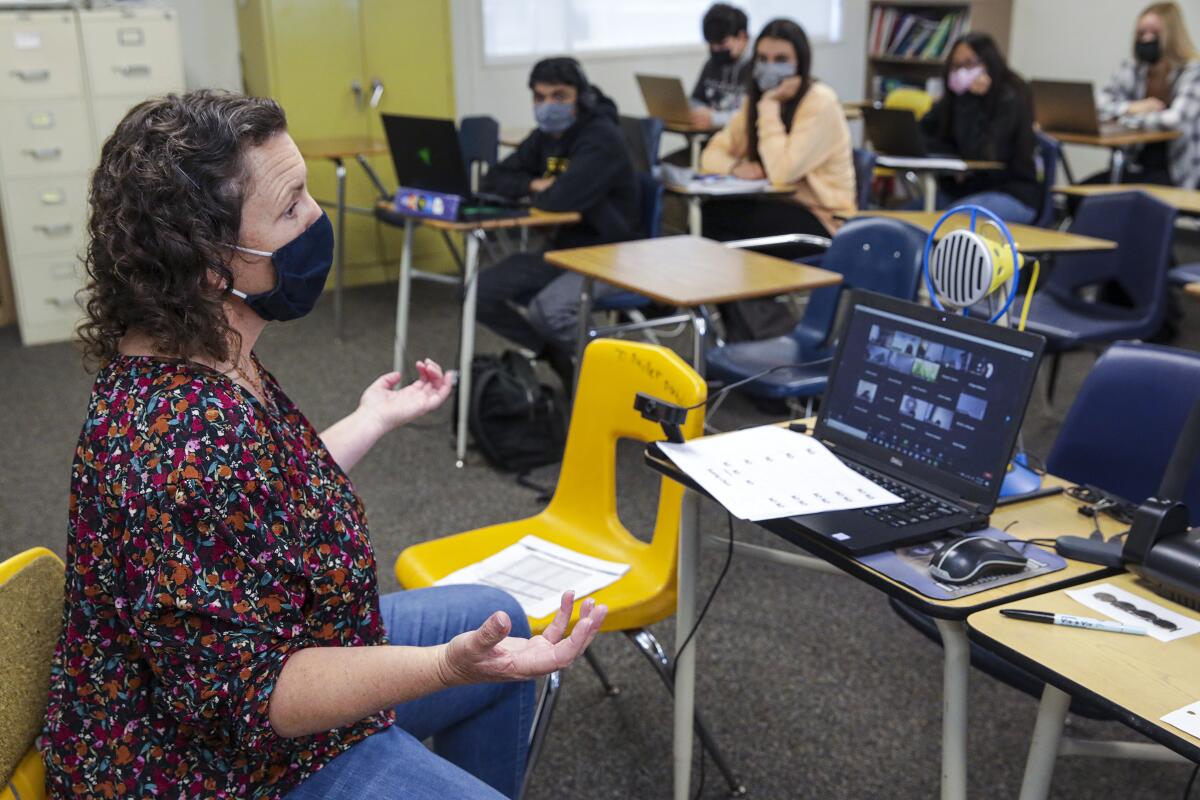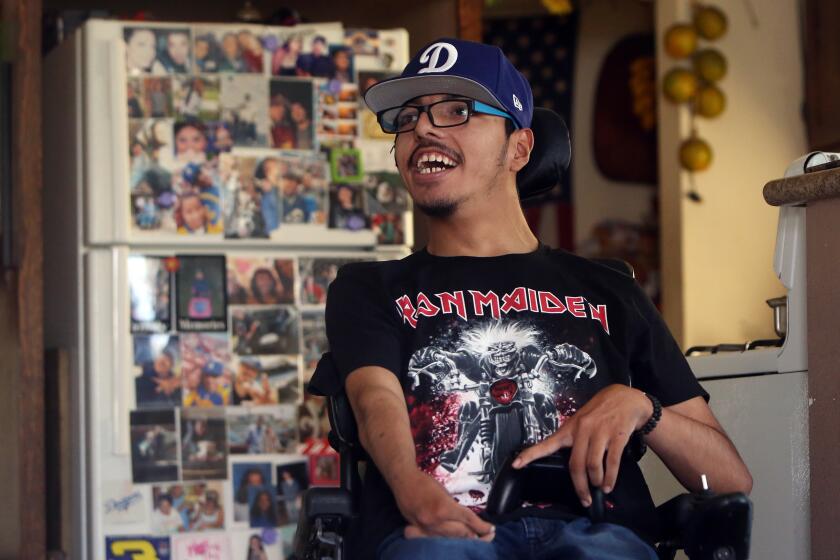Court order reinstates distance learning for group of disabled students

- Share via
State officials must act immediately to provide distance learning that is comparable to last year for students with disabilities and also adequate to their overall needs, a judge has ordered.
The court finding, in the form of a temporary restraining order issued Thursday, will provide immediate relief for 15 students — with several dozen others that could follow — but there are broad implications for students across California.
The practices at issue arise from Assembly Bill 130, which put in place rules meant to ensure that school districts provided and prioritized in-person instruction for all students this fall after the pandemic resulted in campus closures the previous year.
But the law also had unintended consequences. The alleged harm in this case was that families that wanted remote learning for students with disabilities — including those who needed it for health reasons — faced delays and roadblocks that kept them out of school and denied them needed services.
“The Court finds that plaintiffs have demonstrated irreparable harm,” wrote federal Judge Susan Illston of the Northern District of California. “The declarations submitted by plaintiffs show that AB130 has forced parents to choose between the harm of their children losing educational opportunity or risking their health and safety. The declarations detail the very real health risks that these students face if they are required to attend in-person school as a result of their disabilities and the COVID-19 pandemic, as well as the educational losses the students have and will experience as a result of missing instruction.”
Susan, the mother of M.G., a 10-year-old student with Down syndrome, said in a declaration that her son’s respiratory problems would put him at excessive risk were he to contract COVID-19. (Full names are being withheld — as they are in court documents — to respect the privacy of the students.)
M.G. previously attended “a moderate to severe special day class,” which is for special-education students with more intensive needs. When the pandemic resulted in campus closures in March 2020, it took several months for his services to be fully reestablished in his L.A. County school district. Despite the pandemic, things went surprisingly well during the 2020-21 academic year, during which he received two to three hours of live instruction per day.
“His teacher last year had it nailed down,” Susan said in an interview. “She was effective. The materials were effective. We were fortunate to be in a classroom last year that ran very smoothly. She used the technology effectively. He did learn. He did make progress. He was engaged. He did see his peers everyday.”
He also received speech and language services, adapted physical education and occupational therapy.
For the new school year, however, Susan was told that remote learning could not be provided as before. The only remote option — because of AB130 — was a form of independent study that lacked the services needed for her son. Only the district’s “general education curriculum” would be available.
At one point, the district considered providing “home hospital” services, which would provide only five hours of instruction per week, with no additional services. The district ultimately decided that M.G. wasn’t eligible.
Like other parents involved in the court case, Susan is going through established due-process procedures, but they have proved futile or are part of proceedings likely to stretch out across much of the current school year — which for M.G. has yet to start.
In mid-September, Susan began paying for a private tutor, but worries that her son is missing out on social contact and therapeutic services. She also worries about families without legal assistance or the ability to pay for a tutor.
“The most vulnerable in the population are the ones sitting at home not getting educated,” Susan said.
Schools have been told they must provide equal learning opportunities to students with disabilities, but the schools and parents say that’s not happening during the coronavirus crisis.
Close to 12% of public school students in California — about 721,000 — have recognized disabilities. Many — probably most — of these students have returned to campuses. An unknown but substantial number of families have wanted their children to remain in remote learning.
Seven of the students involved in the lawsuit are from Los Angeles Unified, the nation’s second-largest school system. District officials have acknowledged extensive and extended problems with their independent study program, called City of Angels. These problems affected all kinds of students, but students with disabilities faced particular challenges, according to parents and advocates.
L.A. Unified had no immediate reaction to the court order.
Other school districts have had similar problems. Districts with students involved in the litigation include Capistrano Unified, Long Beach Unified, San Diego Unified, San Francisco Unified and Anaheim Unified.
“These are among the largest districts in the state,” said attorney David German, who was part of a team representing the parents who sued. “The problem is very widespread.”
Attorneys did not sue the individual school districts. Instead, the litigation is against the state of California, the state Board of Education and the California Department of Education.
In a statement, the state education department said that it was “disappointed” by the ruling and that it has worked to make sure the rights of these students are protected. These efforts have included notifying school systems about their “legal obligations to serve students with disabilities.”
“California will continue to work diligently to ensure that all students receive the education they deserve and need to live and thrive in our state,” the statement said.
In another declaration, the mother of a 13-year-old student who has autism and other disabilities recounted that she was told neither remote learning nor independent study was available. Her daughter would be at heightened risk of serious complications if she caught COVID-19.
“They said I would need to submit a doctor’s note about why [C.B.] cannot go to school in person so that they could consider Home Hospital Instruction,” she stated. “They told me that C would only get five minutes of instruction per day if someone were [to] come to the home to provide academic instruction. They told me they are only prepared for in-person learning.”
C.B.’s family tried sending her to campus, but she came home with a cold in less than a week. They were thankful it wasn’t COVID and quickly ended that experiment.
H.H. is 21, has multiple disabilities and is nearing the end of her access to K-12 education. The pandemic has cost her a lot during an important developmental stage, said her mother, Melissa. But last year, she was in school virtually from 8:30 a.m. to 2:30 p.m. receiving instruction as well as nursing and therapeutic services at a private school through a contract with the local Orange County school system.
According to the suit, services from such schools are off limits under AB 130. Returning in person is medically out of the question, her mother said, because of her daughter’s tracheotomy complications and chronic lung disease.
H.H., too, is waiting at home.
“For me to choose between her health and school, it’s pretty easy for me,” Melissa said in an interview. “She does ask and doesn’t understand why she can’t see her friends and teachers and therapists.”
More to Read
Sign up for Essential California
The most important California stories and recommendations in your inbox every morning.
You may occasionally receive promotional content from the Los Angeles Times.












